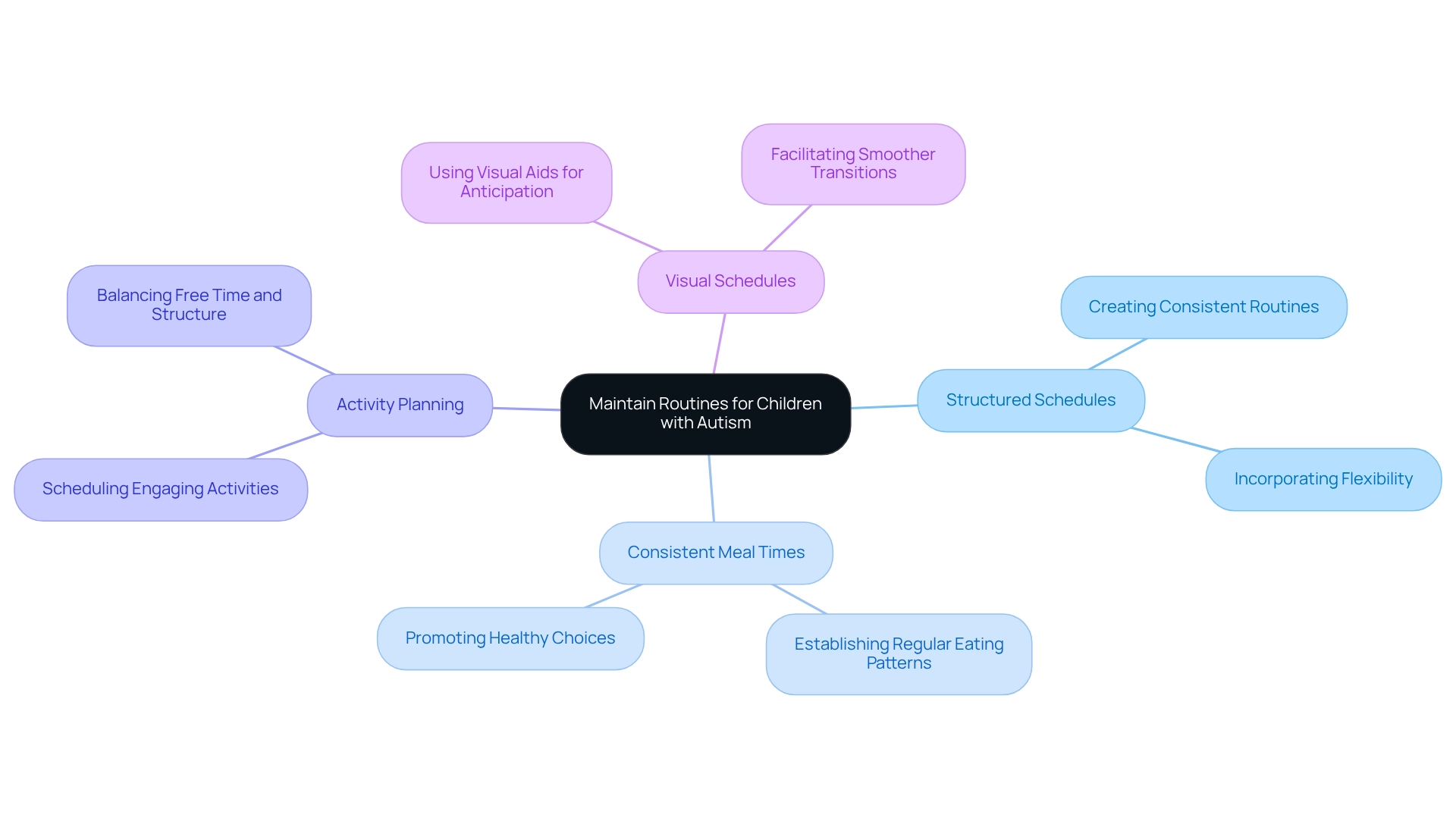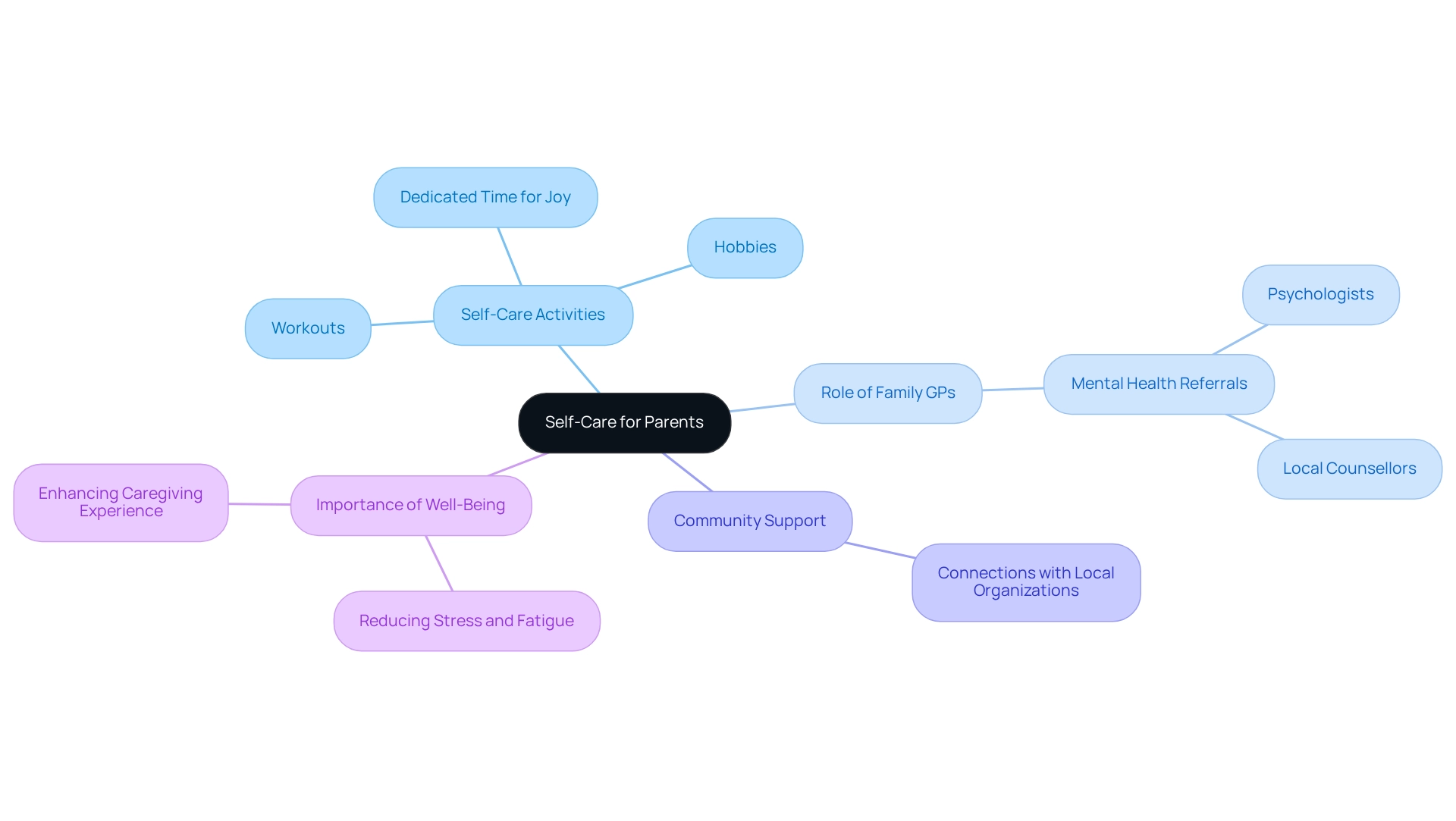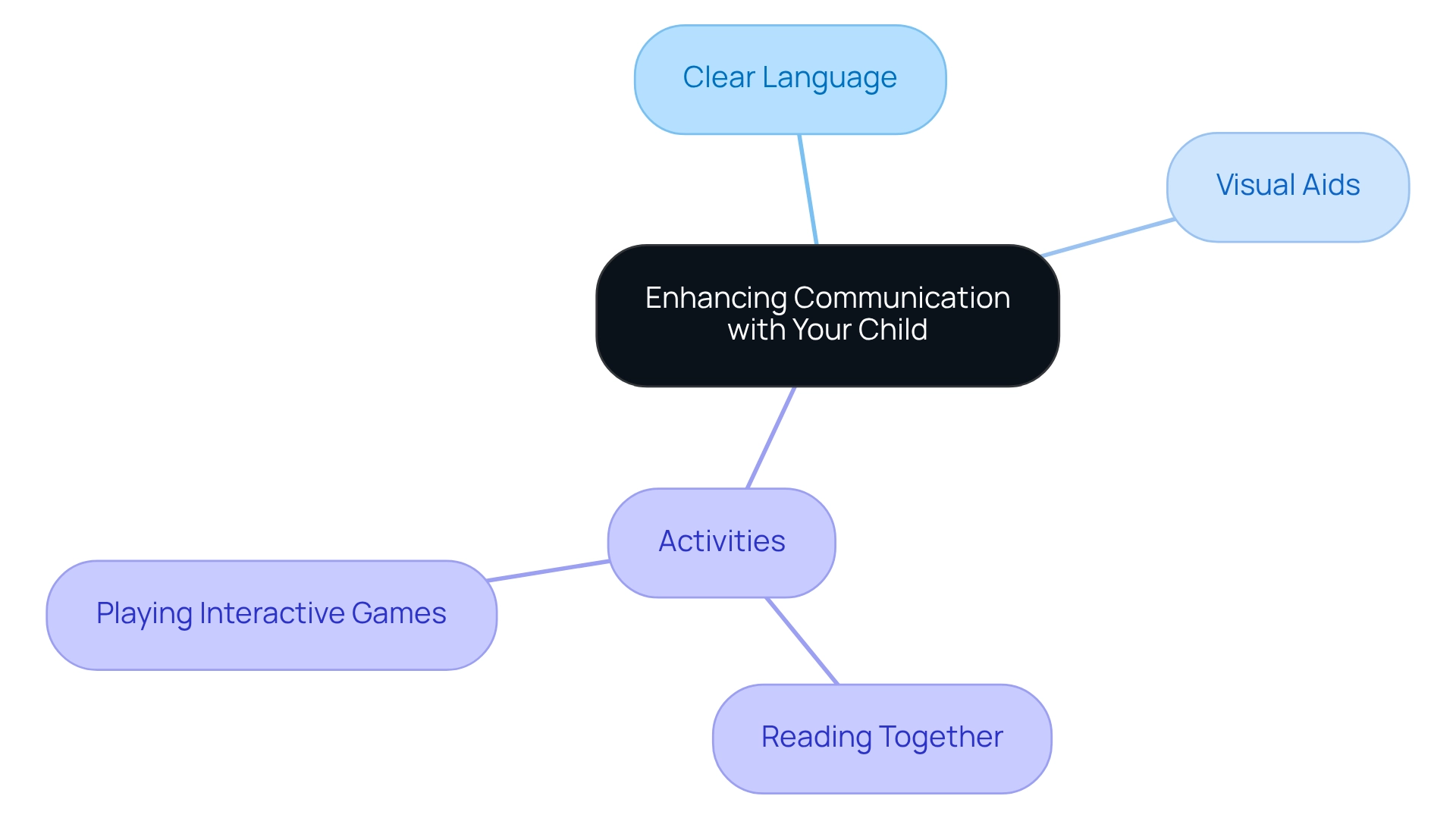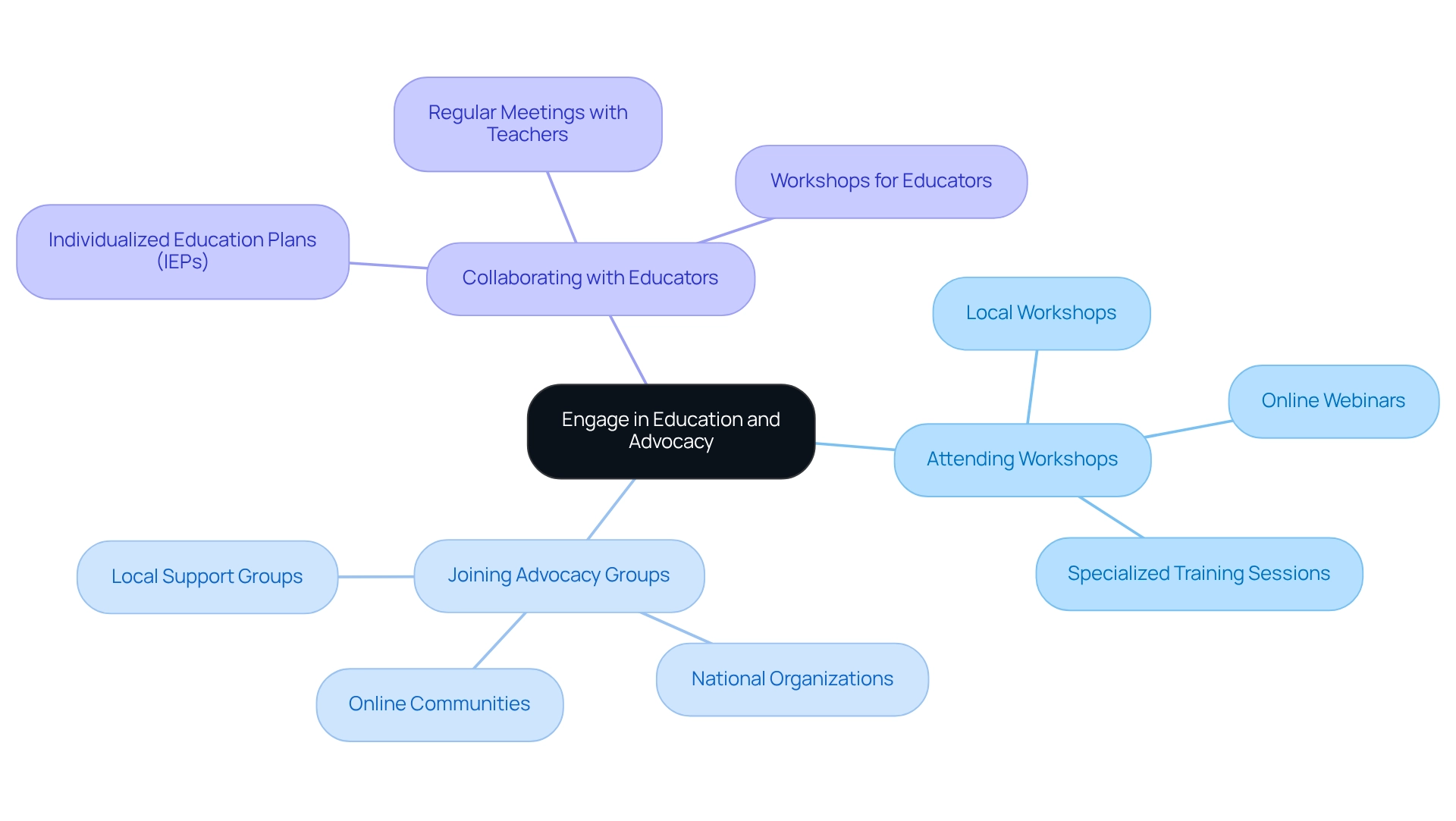Overview
The article "10 Essential Autism Coping Strategies for Parents" serves as a compassionate guide for parents seeking effective ways to support their children with autism. It draws attention to vital strategies such as:
- Maintaining routines
- Practicing self-care
- Enhancing communication
- Fostering connections
Each approach is thoughtfully backed by research and expert insights, underscoring their significance in nurturing a supportive environment for both children and caregivers. By sharing these strategies, the article aims to inspire hope and provide practical tools that parents can implement in their daily lives.
Introduction
Navigating the complexities of autism can indeed feel like a daunting journey for parents and caregivers. However, a wealth of resources and strategies exists to empower them along the way. Establishing consistent routines fosters a sense of security, while prioritizing self-care ensures parental well-being. Each of these aspects plays a crucial role in enhancing the quality of life for both children and their families.
This article delves into practical approaches to support children with autism. We will explore:
- Effective communication techniques
- Mindfulness practices
- The importance of physical activity
- The significance of building a strong support network
- Creating sensory-friendly environments
These strategies aim to promote emotional resilience and independence in children.
By exploring these approaches, parents can cultivate a nurturing atmosphere that not only addresses immediate challenges but also unlocks their children's potential for growth and happiness. We invite you to join us on this journey, sharing your experiences and insights as we navigate this path together.
About ASD Media: Comprehensive Resources for Autism Support
At ASD Media, we are deeply committed to enhancing the implementation of ABA therapy by offering a wealth of resources and insights specifically designed for parents and professionals. Our mission is to cultivate a supportive community where individuals can share their experiences and learn from one another. By signing up for our newsletter, families can stay informed about the latest autism coping strategies and resources available to help navigate the challenges associated with developmental disorders and ADHD. Together, we can empower you to realize your child's full potential.
Maintain Routines: Establishing Consistency for Children with Autism
Establishing regular daily habits can profoundly support children with developmental disorders by utilizing autism coping strategies that provide them with a sense of safety and reliability. For parents, creating structured schedules that incorporate consistent times for meals, activities, and bedtime is essential as part of autism coping strategies. Visual schedules can also play a crucial role in autism coping strategies by allowing young individuals to anticipate what lies ahead in their day. This not only facilitates smoother transitions but also helps to alleviate anxiety through effective autism coping strategies.
By understanding the importance of routine, you can create a nurturing environment that fosters growth and stability. Consider sharing your experiences or strategies in the comments below, as your insights may resonate with others navigating similar challenges.

Practice Self-Care: Prioritizing Parental Well-Being
Parents of children with autism often encounter unique challenges that can lead to heightened stress and fatigue. It's essential to recognize that engaging in self-care activities and practicing self-compassion can significantly reduce these feelings. Research indicates that caregivers who prioritize their well-being—through regular self-care practices such as consistent workouts, pursuing hobbies, or simply taking time to unwind—report lower stress levels. This underscores the importance of nurturing oneself in order to better support their children.
Additionally, family GPs can serve as valuable allies in this journey. They are well-positioned to connect parents with mental health professionals who can assist in managing stress and promoting self-care. As Mandy Kienhuis from the Parenting Research Centre expresses, 'Family GPs are a good starting point, as they can refer to suitable mental health professionals such as psychologists or local counsellors.' By fostering self-compassion and implementing effective self-care strategies, parents not only enhance their own mental health but also cultivate a more supportive environment for their children, ultimately enriching the caregiving experience.
Moreover, forging connections with community organizations can provide essential support for caregivers seeking additional resources. To effectively incorporate self-care into their routines, parents are encouraged to carve out dedicated time each week for activities that bring them joy and relaxation. This practice reinforces the significance of their well-being throughout their caregiving journey, reminding them that caring for themselves is just as important as caring for their children.

Enhance Communication: Building Stronger Connections with Your Child
Enhancing communication with your child can profoundly strengthen your relationship. By using clear and simple language, along with visual aids, parents can effectively convey their messages. Imagine the joy of seeing your child express themselves through pictures, gestures, or even technology—these methods can significantly enhance understanding and connection.
Regularly engaging in activities that foster communication, such as:
- Reading together
- Playing interactive games
not only promotes dialogue but also deepens these precious bonds. Consider how these moments can transform your interactions and create lasting memories.

Incorporate Mindfulness: Techniques for Reducing Stress
Incorporating mindfulness techniques into daily routines can significantly reduce stress for both parents and their children. Imagine starting your day with a few moments of deep breathing exercises, guided imagery, or even a brief meditation session. These simple practices not only promote relaxation but also enhance emotional regulation for the entire family.
As parents, you have the unique opportunity to demonstrate these techniques. Engaging in mindfulness practices alongside your children creates a shared experience that nurtures calmness and strengthens your connection. Consider how much more relaxed and connected you could feel together when you take those moments to breathe deeply and be present.
Why not give it a try? Share your experiences with mindfulness in the comments or through our newsletter. Together, we can support each other in fostering a peaceful and loving environment for our families.
Encourage Physical Activity: Promoting Health and Well-Being
Encouraging consistent physical activity is essential for youth with autism, as it greatly enhances both their physical health and emotional well-being. Engaging in activities such as swimming, dancing, or simple outdoor play not only fosters fitness but also contributes to improved mood and social skills. Research indicates that structured exercise interventions can lead to better quality of life outcomes for these individuals, with an average reactivity score of 3.9 out of 8 observed in exercise-intervention groups, suggesting a moderate level of responsiveness to these activities.
To cultivate a positive relationship with exercise, parents should focus on making physical activities enjoyable and seamlessly integrating them into daily routines. This approach not only fosters consistency but also helps young ones link movement with enjoyment, enhancing their long-term involvement. Pediatricians highlight that consistent physical activity can reduce the heightened risk of obesity and associated metabolic disorders frequently observed in youth with autism.
As noted by Chrystiane V. A. Toscano, individuals and teenagers with ASD face a heightened risk of obesity, making physical activity even more crucial. By applying effective autism coping strategies to encourage exercise—such as including enjoyable games or family activities—caregivers can significantly improve their children's overall well-being and emotional resilience. Moreover, while recent studies endorse the advantages of physical activity, there is an acknowledged need for further research to explore the comprehensive effects of organized exercise programs on youth with developmental disorders.
Foster Connections: Building a Support Network with Other Parents
Creating a network of assistance with other caregivers of children with autism offers significant benefits. By sharing experiences, resources, and autism coping strategies, caregivers can cultivate a strong sense of community that alleviates feelings of isolation. Engaging in local assistance groups or online discussions not only fosters connections but also provides a vital platform for emotional support and practical advice. Studies indicate that caregivers involved in these networks report higher levels of contentment and reduced stress. In fact, participation in groups for individuals with developmental disorders has seen a notable increase in recent years, underscoring the transformative impact of community engagement.
Specialist insights further emphasize that these networks are essential for navigating the complexities of advocacy related to developmental disorders. A leader from a prominent autism support group shared, 'Building a network is not just about sharing resources; it's about creating a family that understands your journey.' This sentiment resonates deeply, as successful case studies, such as 'How to Support Your Offspring's Communication Development Through ABA Guardian Training,' illustrate how collaborative efforts among caregivers lead to improved outcomes for their children. This reinforces the idea that together, they can foster a more supportive environment.
As one parent insightfully remarked, 'I don’t always have all the answers, but I do have Google,' highlighting the importance of shared knowledge and resources on this journey. By connecting with others, caregivers not only find solace but also empower one another to navigate the challenges ahead by sharing autism coping strategies.
Address Sensory Needs: Creating a Comfortable Environment
Creating a sensory-friendly atmosphere at home is essential for using autism coping strategies to help children with developmental disorders feel comfortable and secure. Consider key factors such as lighting, noise levels, and the presence of calming spaces. Did you know that around 70% of individuals on the autism spectrum experience sensory processing challenges? This statistic underscores the significance of tailoring environments to meet their unique needs. For instance, implementing soft lighting can help reduce overstimulation, while minimizing background noise promotes a peaceful setting.
Additionally, incorporating sensory tools like fidget toys, weighted blankets, and noise-canceling headphones can greatly enhance comfort and foster a sense of calm. As O. Ivar Lovaas wisely noted, 'If they can't learn the way we teach, we teach the way they learn.' This highlights the necessity of adapting environments to support individual learning styles. Occupational therapists emphasize that a thoughtfully designed sensory environment can lead to better focus and emotional regulation, which are important autism coping strategies. Moreover, Mary Barbera encourages us to 'Embrace the amazing gift of neurodiversity,' inspiring a positive perspective that aligns with our goal of creating nurturing spaces. By implementing these strategies and making informed choices about therapeutic interventions, as discussed in the case study 'Understanding the ABA Controversy,' caregivers can cultivate an environment that meets their children's sensory needs and promotes overall well-being. What strategies have you found helpful in your own journey? Share your experiences with us!
Utilize Coping Tools: Resources for Everyday Challenges
Coping tools play a crucial role in implementing autism coping strategies that help caregivers and individuals navigate the everyday challenges associated with autism. Resources such as visual schedules, social stories, and calming apps not only provide structure but also foster a sense of security and predictability. For instance, visual schedules have shown to enhance comprehension and reduce anxiety, facilitating smoother transitions for young ones. In fact, studies indicate that caregivers who implement visual schedules report a significant decrease in behavioral issues, with over 70% noting improved daily routines.
Calming apps, designed to help manage anxiety, can also be quite effective. These tools offer guided relaxation techniques and mindfulness exercises that empower children to self-regulate their emotions. Parents are encouraged to explore a variety of autism coping strategies to determine which resonate best with their family dynamics. By equipping themselves with these resources, parents can create a supportive environment that not only addresses immediate challenges but also promotes long-term emotional well-being.
Case studies highlight the success of these tools. For example, Mike's family reported that implementing a sensory area in his room significantly reduced his anxiety levels, allowing for more peaceful daily interactions. Mike expressed gratitude for the dedication and kindness of his assistance teams, stating, "Thanks to the dedication and kindness of our expert teams at Roselea and Poachers Cottage, I successfully restored both my health and my self-esteem, so I could make this extra special appearance!" This underscores the importance of community and collaboration in the support process.
Additionally, experts emphasize the importance of communication in utilizing these tools effectively. The case study titled 'Empowering Through Communication' illustrates how prioritizing clear and consistent communication can empower individuals with developmental disorders, enhancing their understanding and engagement with the coping strategies in place.
Ultimately, the appropriate autism coping strategies can transform everyday challenges into manageable tasks, promoting resilience and independence in individuals on the autism spectrum. Significant connections are crucial for joy and emotional support, reinforcing the notion that caregivers are motivated to proactively pursue and exchange beneficial resources within their community, thus enhancing the cooperative spirit vital for managing the intricacies of developmental disorders.
Engage in Education and Advocacy: Empowering Yourself and Your Child
Participating in education and advocacy is vital for guardians of individuals with autism. By understanding their child's rights and the resources available, parents can effectively advocate for the necessary services and support. This journey may include:
- Attending workshops
- Joining advocacy groups
- Collaborating with educators to ensure their child's needs are met in school and beyond
Imagine a parent navigating the complexities of the educational system, feeling overwhelmed yet determined to secure the best for their child. By connecting with others in similar situations, they can share experiences and strategies that make a difference.
Consider attending a local workshop or reaching out to advocacy groups. These resources not only provide valuable information but also create a supportive community. Together, we can ensure that every child receives the care and attention they deserve.

Conclusion
Navigating the complexities of autism is undoubtedly a journey filled with challenges, yet it also offers profound opportunities for connection and growth. By establishing consistent routines, you create a sense of security for your child, while effective communication techniques can deepen understanding and strengthen your bond. Remember, prioritizing self-care is not just beneficial for you; it directly impacts your ability to provide the support your child needs. Mindfulness practices and physical activity can significantly enhance the emotional and physical well-being of children with autism.
Building a robust support network with fellow parents can alleviate feelings of isolation. Together, you can create a community where knowledge and resources flow freely. Consider crafting sensory-friendly environments tailored to your child's unique needs, helping them feel more at ease. Utilizing coping tools like visual schedules and calming apps can empower your family to navigate daily challenges with greater ease.
Ultimately, engaging in education and advocacy equips you with the knowledge and confidence to stand up for your child's rights and needs. By embracing these strategies and nurturing a supportive atmosphere, you unlock the potential for your child's growth and happiness. This journey, while challenging, is rich with opportunities for resilience and empowerment, benefiting not just your child but your entire family unit. Together, let’s continue to share experiences and support one another in this meaningful endeavor.
Frequently Asked Questions
What is the mission of ASD Media?
ASD Media is committed to enhancing the implementation of ABA therapy by providing resources and insights for parents and professionals, fostering a supportive community where individuals can share experiences and learn from one another.
How can families stay informed about autism coping strategies?
Families can stay informed by signing up for the ASD Media newsletter, which provides updates on the latest autism coping strategies and resources for navigating challenges associated with developmental disorders and ADHD.
What role do daily habits play in supporting children with developmental disorders?
Establishing regular daily habits can provide children with a sense of safety and reliability, which is essential for their development. Structured schedules that include consistent times for meals, activities, and bedtime are important autism coping strategies.
How do visual schedules benefit children with autism?
Visual schedules help young individuals anticipate their daily activities, facilitating smoother transitions and reducing anxiety, thus supporting their overall coping strategies.
What self-care practices can parents of children with autism engage in?
Parents can prioritize their well-being through self-care activities such as regular workouts, pursuing hobbies, and setting aside time to unwind, which can significantly reduce stress and fatigue.
How can family GPs assist parents of children with autism?
Family GPs can connect parents with mental health professionals who can help manage stress and promote self-care, serving as a good starting point for finding suitable support.
Why is self-care important for parents of children with autism?
Nurturing oneself through self-care enhances parents' mental health and creates a more supportive environment for their children, ultimately enriching the caregiving experience.
What recommendations are there for incorporating self-care into parenting routines?
Parents are encouraged to carve out dedicated time each week for activities that bring them joy and relaxation, reinforcing the importance of their well-being throughout their caregiving journey.




